#include "lwip/opt.h"#include "lwip/mem.h"#include "lwip/def.h"#include "lwip/sys.h"#include "lwip/stats.h"#include "lwip/err.h"#include <string.h>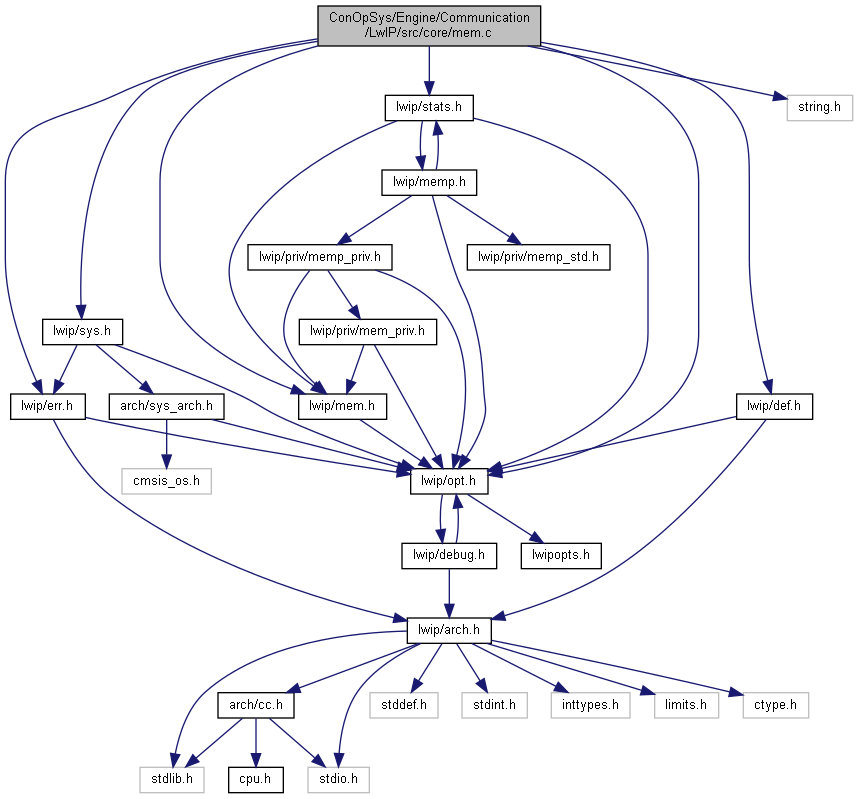
Classes | |
| struct | mem |
Macros | |
| #define | LWIP_MEM_ILLEGAL_FREE(msg) LWIP_ASSERT(msg, 0) |
| #define | MEM_STATS_INC_LOCKED(x) SYS_ARCH_LOCKED(MEM_STATS_INC(x)) |
| #define | MEM_STATS_INC_USED_LOCKED(x, y) SYS_ARCH_LOCKED(MEM_STATS_INC_USED(x, y)) |
| #define | MEM_STATS_DEC_USED_LOCKED(x, y) SYS_ARCH_LOCKED(MEM_STATS_DEC_USED(x, y)) |
| #define | MEM_SANITY_OFFSET 0 |
| #define | MEM_SANITY_OVERHEAD 0 |
| #define | MIN_SIZE 12 |
| #define | MIN_SIZE_ALIGNED LWIP_MEM_ALIGN_SIZE(MIN_SIZE) |
| #define | SIZEOF_STRUCT_MEM LWIP_MEM_ALIGN_SIZE(sizeof(struct mem)) |
| #define | MEM_SIZE_ALIGNED LWIP_MEM_ALIGN_SIZE(MEM_SIZE) |
| #define | LWIP_RAM_HEAP_POINTER ram_heap |
| #define | LWIP_MEM_FREE_DECL_PROTECT() |
| #define | LWIP_MEM_FREE_PROTECT() sys_mutex_lock(&mem_mutex) |
| #define | LWIP_MEM_FREE_UNPROTECT() sys_mutex_unlock(&mem_mutex) |
| #define | LWIP_MEM_ALLOC_DECL_PROTECT() |
| #define | LWIP_MEM_ALLOC_PROTECT() |
| #define | LWIP_MEM_ALLOC_UNPROTECT() |
| #define | LWIP_MEM_LFREE_VOLATILE |
| #define | MEM_SANITY() |
| #define | mem_overflow_init_element(mem, size) |
| #define | mem_overflow_check_element(mem) |
Functions | |
| LWIP_DECLARE_MEMORY_ALIGNED (ram_heap, MEM_SIZE_ALIGNED+(2U *SIZEOF_STRUCT_MEM)) | |
| static struct mem * | ptr_to_mem (mem_size_t ptr) |
| static mem_size_t | mem_to_ptr (void *mem) |
| static void | plug_holes (struct mem *mem) |
| void | mem_init (void) |
| static int | mem_link_valid (struct mem *mem) |
| void | mem_free (void *rmem) |
| void * | mem_trim (void *rmem, mem_size_t new_size) |
| void * | mem_malloc (mem_size_t size_in) |
| void * | mem_calloc (mem_size_t count, mem_size_t size) |
Variables | |
| static u8_t * | ram |
| static struct mem * | ram_end |
| static sys_mutex_t | mem_mutex |
| static struct mem *LWIP_MEM_LFREE_VOLATILE | lfree |
Detailed Description
Dynamic memory manager
This is a lightweight replacement for the standard C library malloc().
If you want to use the standard C library malloc() instead, define MEM_LIBC_MALLOC to 1 in your lwipopts.h
To let mem_malloc() use pools (prevents fragmentation and is much faster than a heap but might waste some memory), define MEM_USE_POOLS to 1, define MEMP_USE_CUSTOM_POOLS to 1 and create a file "lwippools.h" that includes a list of pools like this (more pools can be added between _START and _END):
Define three pools with sizes 256, 512, and 1512 bytes LWIP_MALLOC_MEMPOOL_START LWIP_MALLOC_MEMPOOL(20, 256) LWIP_MALLOC_MEMPOOL(10, 512) LWIP_MALLOC_MEMPOOL(5, 1512) LWIP_MALLOC_MEMPOOL_END
Macro Definition Documentation
◆ LWIP_MEM_ALLOC_DECL_PROTECT
| #define LWIP_MEM_ALLOC_DECL_PROTECT | ( | ) |
◆ LWIP_MEM_ALLOC_PROTECT
| #define LWIP_MEM_ALLOC_PROTECT | ( | ) |
◆ LWIP_MEM_ALLOC_UNPROTECT
| #define LWIP_MEM_ALLOC_UNPROTECT | ( | ) |
◆ LWIP_MEM_FREE_DECL_PROTECT
| #define LWIP_MEM_FREE_DECL_PROTECT | ( | ) |
◆ LWIP_MEM_FREE_PROTECT
| #define LWIP_MEM_FREE_PROTECT | ( | ) | sys_mutex_lock(&mem_mutex) |
◆ LWIP_MEM_FREE_UNPROTECT
| #define LWIP_MEM_FREE_UNPROTECT | ( | ) | sys_mutex_unlock(&mem_mutex) |
◆ LWIP_MEM_ILLEGAL_FREE
| #define LWIP_MEM_ILLEGAL_FREE | ( | msg | ) | LWIP_ASSERT(msg, 0) |
◆ LWIP_MEM_LFREE_VOLATILE
| #define LWIP_MEM_LFREE_VOLATILE |
◆ LWIP_RAM_HEAP_POINTER
| #define LWIP_RAM_HEAP_POINTER ram_heap |
◆ mem_overflow_check_element
| #define mem_overflow_check_element | ( | mem | ) |
◆ mem_overflow_init_element
| #define mem_overflow_init_element | ( | mem, | |
| size | |||
| ) |
◆ MEM_SANITY
| #define MEM_SANITY | ( | ) |
◆ MEM_SANITY_OFFSET
| #define MEM_SANITY_OFFSET 0 |
◆ MEM_SANITY_OVERHEAD
| #define MEM_SANITY_OVERHEAD 0 |
◆ MEM_SIZE_ALIGNED
| #define MEM_SIZE_ALIGNED LWIP_MEM_ALIGN_SIZE(MEM_SIZE) |
◆ MEM_STATS_DEC_USED_LOCKED
| #define MEM_STATS_DEC_USED_LOCKED | ( | x, | |
| y | |||
| ) | SYS_ARCH_LOCKED(MEM_STATS_DEC_USED(x, y)) |
◆ MEM_STATS_INC_LOCKED
| #define MEM_STATS_INC_LOCKED | ( | x | ) | SYS_ARCH_LOCKED(MEM_STATS_INC(x)) |
◆ MEM_STATS_INC_USED_LOCKED
| #define MEM_STATS_INC_USED_LOCKED | ( | x, | |
| y | |||
| ) | SYS_ARCH_LOCKED(MEM_STATS_INC_USED(x, y)) |
◆ MIN_SIZE
| #define MIN_SIZE 12 |
All allocated blocks will be MIN_SIZE bytes big, at least! MIN_SIZE can be overridden to suit your needs. Smaller values save space, larger values could prevent too small blocks to fragment the RAM too much.
◆ MIN_SIZE_ALIGNED
| #define MIN_SIZE_ALIGNED LWIP_MEM_ALIGN_SIZE(MIN_SIZE) |
◆ SIZEOF_STRUCT_MEM
| #define SIZEOF_STRUCT_MEM LWIP_MEM_ALIGN_SIZE(sizeof(struct mem)) |
Function Documentation
◆ LWIP_DECLARE_MEMORY_ALIGNED()
| LWIP_DECLARE_MEMORY_ALIGNED | ( | ram_heap | , |
| MEM_SIZE_ALIGNED+ | 2U *SIZEOF_STRUCT_MEM | ||
| ) |
If you want to relocate the heap to external memory, simply define LWIP_RAM_HEAP_POINTER as a void-pointer to that location. If so, make sure the memory at that location is big enough (see below on how that space is calculated). the heap. we need one struct mem at the end and some room for alignment
◆ mem_calloc()
| void* mem_calloc | ( | mem_size_t | count, |
| mem_size_t | size | ||
| ) |
Contiguously allocates enough space for count objects that are size bytes of memory each and returns a pointer to the allocated memory.
The allocated memory is filled with bytes of value zero.
- Parameters
-
count number of objects to allocate size size of the objects to allocate
- Returns
- pointer to allocated memory / NULL pointer if there is an error
References LWIP_DBG_LEVEL_SERIOUS, LWIP_DEBUGF, MEM_DEBUG, mem_malloc(), NULL, and SZT_F.
Referenced by bridgeif_fdb_init().
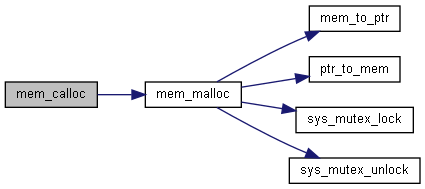

◆ mem_free()
| void mem_free | ( | void * | rmem | ) |
Put a struct mem back on the heap
- Parameters
-
rmem is the data portion of a struct mem as returned by a previous call to mem_malloc()
References lfree, LWIP_DBG_LEVEL_SERIOUS, LWIP_DBG_LEVEL_SEVERE, LWIP_DBG_TRACE, LWIP_DEBUGF, LWIP_MEM_FREE_DECL_PROTECT, LWIP_MEM_FREE_PROTECT, LWIP_MEM_FREE_UNPROTECT, LWIP_MEM_ILLEGAL_FREE, MEM_ALIGNMENT, MEM_DEBUG, mem_link_valid(), mem_overflow_check_element, MEM_SANITY, MEM_SANITY_OFFSET, MEM_STATS_DEC_USED, MEM_STATS_INC_LOCKED, mem::next, NULL, plug_holes(), ram, ram_end, SIZEOF_STRUCT_MEM, and mem::used.
Referenced by do_memp_free_pool(), mem_free_callback(), pbuf_free(), and slipif_init().

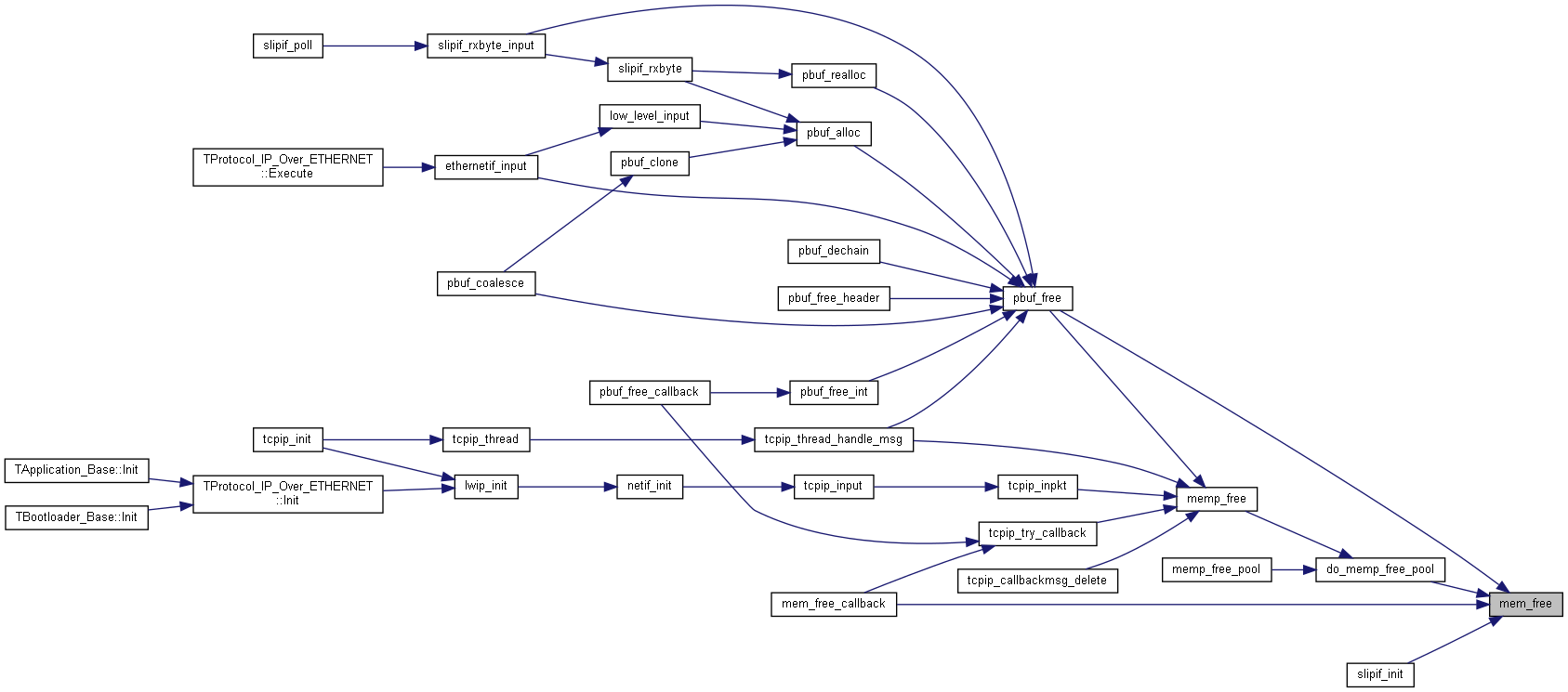
◆ mem_init()
| void mem_init | ( | void | ) |
Zero the heap and initialise start, end and lowest-free
References ERR_OK, lfree, LWIP_ASSERT, LWIP_MEM_ALIGN, LWIP_RAM_HEAP_POINTER, MEM_ALIGNMENT, mem_mutex, MEM_SANITY, MEM_SIZE_ALIGNED, MEM_STATS_AVAIL, mem::next, mem::prev, ptr_to_mem(), ram, ram_end, SIZEOF_STRUCT_MEM, sys_mutex_new(), and mem::used.
Referenced by lwip_init().


◆ mem_link_valid()
|
static |
References MEM_SIZE_ALIGNED, mem_to_ptr(), mem::next, mem::prev, ptr_to_mem(), and ram_end.
Referenced by mem_free().

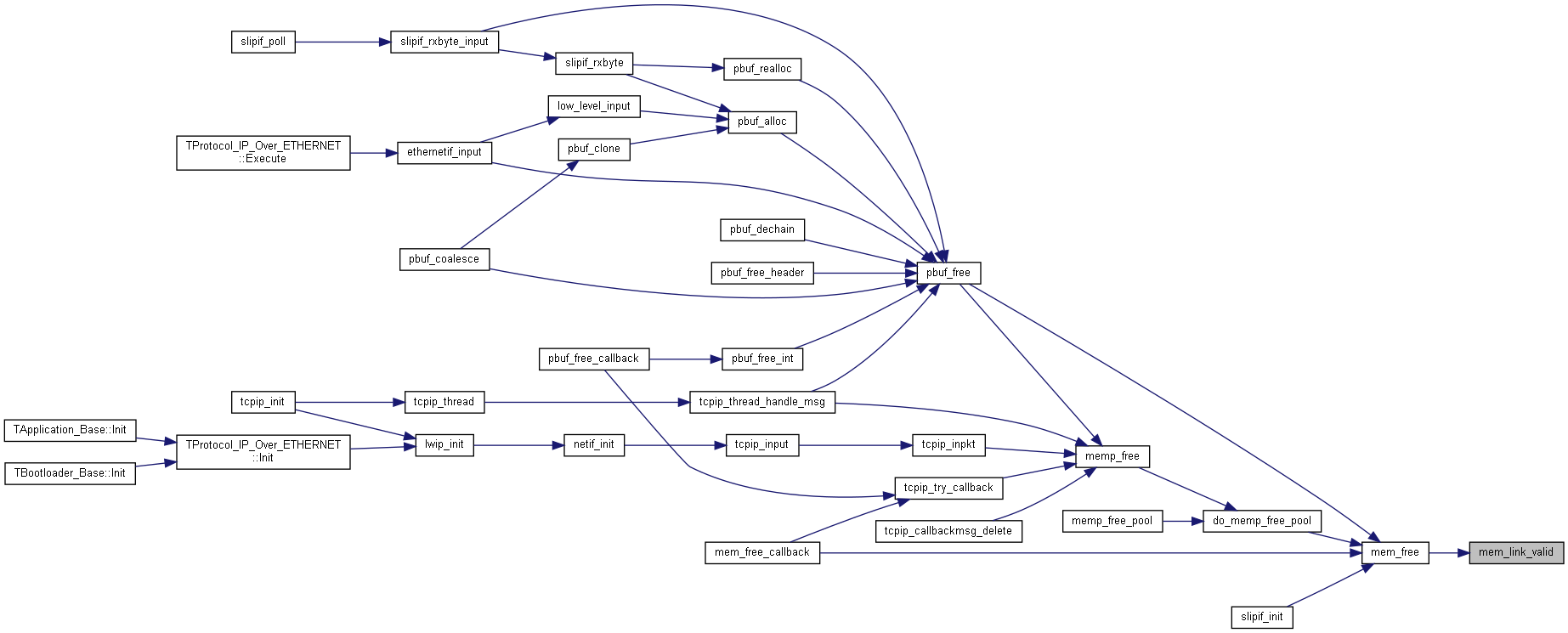
◆ mem_malloc()
| void* mem_malloc | ( | mem_size_t | size_in | ) |
Allocate a block of memory with a minimum of 'size' bytes.
- Parameters
-
size_in is the minimum size of the requested block in bytes.
- Returns
- pointer to allocated memory or NULL if no free memory was found.
Note that the returned value will always be aligned (as defined by MEM_ALIGNMENT).
References lfree, LWIP_ASSERT, LWIP_DBG_LEVEL_SERIOUS, LWIP_DEBUGF, LWIP_MEM_ALIGN_SIZE, LWIP_MEM_ALLOC_DECL_PROTECT, LWIP_MEM_ALLOC_PROTECT, LWIP_MEM_ALLOC_UNPROTECT, MEM_ALIGNMENT, MEM_DEBUG, mem_mutex, mem_overflow_init_element, MEM_SANITY, MEM_SANITY_OFFSET, MEM_SIZE_ALIGNED, MEM_STATS_INC, MEM_STATS_INC_USED, mem_to_ptr(), MIN_SIZE_ALIGNED, mem::next, NULL, mem::prev, ptr_to_mem(), ram_end, S16_F, SIZEOF_STRUCT_MEM, sys_mutex_lock(), sys_mutex_unlock(), and mem::used.
Referenced by do_memp_malloc_pool(), mem_calloc(), pbuf_alloc(), and slipif_init().
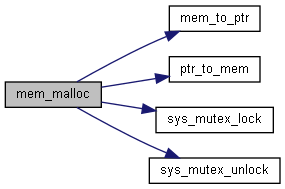

◆ mem_to_ptr()
|
static |
References ram.
Referenced by mem_link_valid(), mem_malloc(), mem_trim(), and plug_holes().
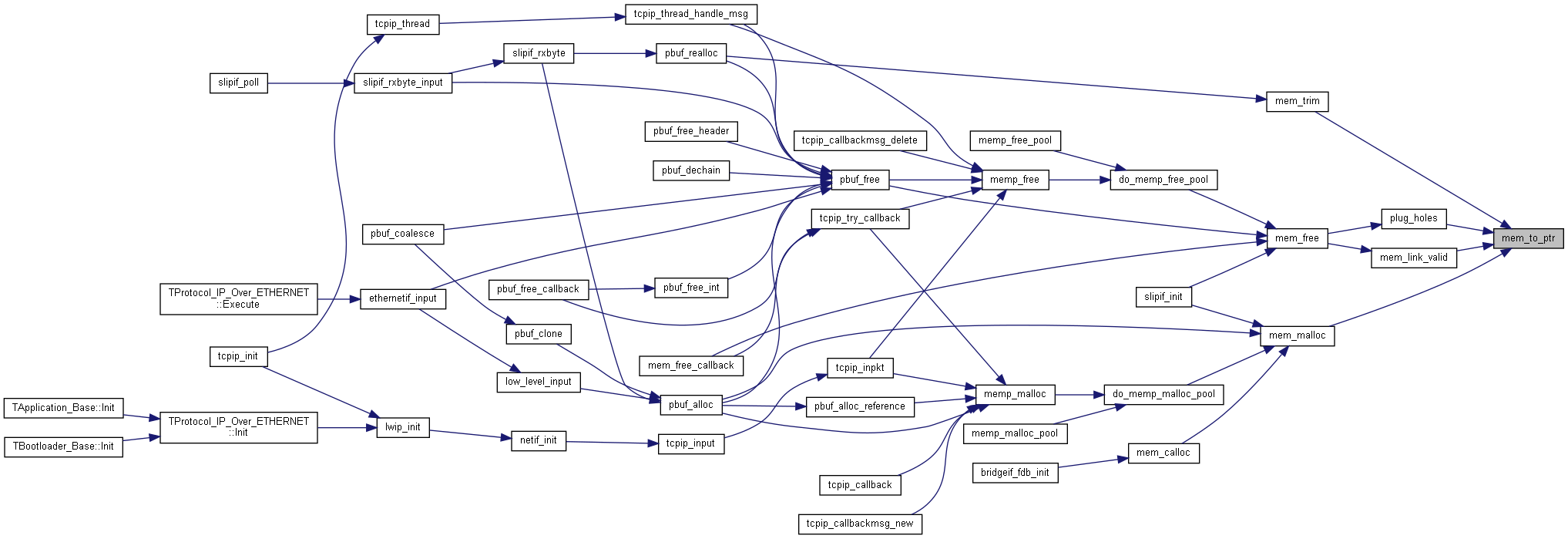
◆ mem_trim()
| void* mem_trim | ( | void * | rmem, |
| mem_size_t | new_size | ||
| ) |
Shrink memory returned by mem_malloc().
- Parameters
-
rmem pointer to memory allocated by mem_malloc the is to be shrinked new_size required size after shrinking (needs to be smaller than or equal to the previous size)
- Returns
- for compatibility reasons: is always == rmem, at the moment or NULL if newsize is > old size, in which case rmem is NOT touched or freed!
References lfree, LWIP_ASSERT, LWIP_DBG_LEVEL_SEVERE, LWIP_DEBUGF, LWIP_MEM_ALIGN_SIZE, LWIP_MEM_FREE_DECL_PROTECT, LWIP_MEM_FREE_PROTECT, LWIP_MEM_FREE_UNPROTECT, MEM_DEBUG, mem_overflow_check_element, mem_overflow_init_element, MEM_SANITY, MEM_SANITY_OFFSET, MEM_SANITY_OVERHEAD, MEM_SIZE_ALIGNED, MEM_STATS_DEC_USED, MEM_STATS_INC_LOCKED, mem_to_ptr(), MIN_SIZE_ALIGNED, mem::next, NULL, mem::prev, ptr_to_mem(), ram, ram_end, SIZEOF_STRUCT_MEM, and mem::used.
Referenced by pbuf_realloc().


◆ plug_holes()
|
static |
"Plug holes" by combining adjacent empty struct mems. After this function is through, there should not exist one empty struct mem pointing to another empty struct mem.
- Parameters
-
mem this points to a struct mem which just has been freed
References lfree, LWIP_ASSERT, MEM_SIZE_ALIGNED, mem_to_ptr(), mem::next, mem::prev, ptr_to_mem(), ram, ram_end, and mem::used.
Referenced by mem_free().

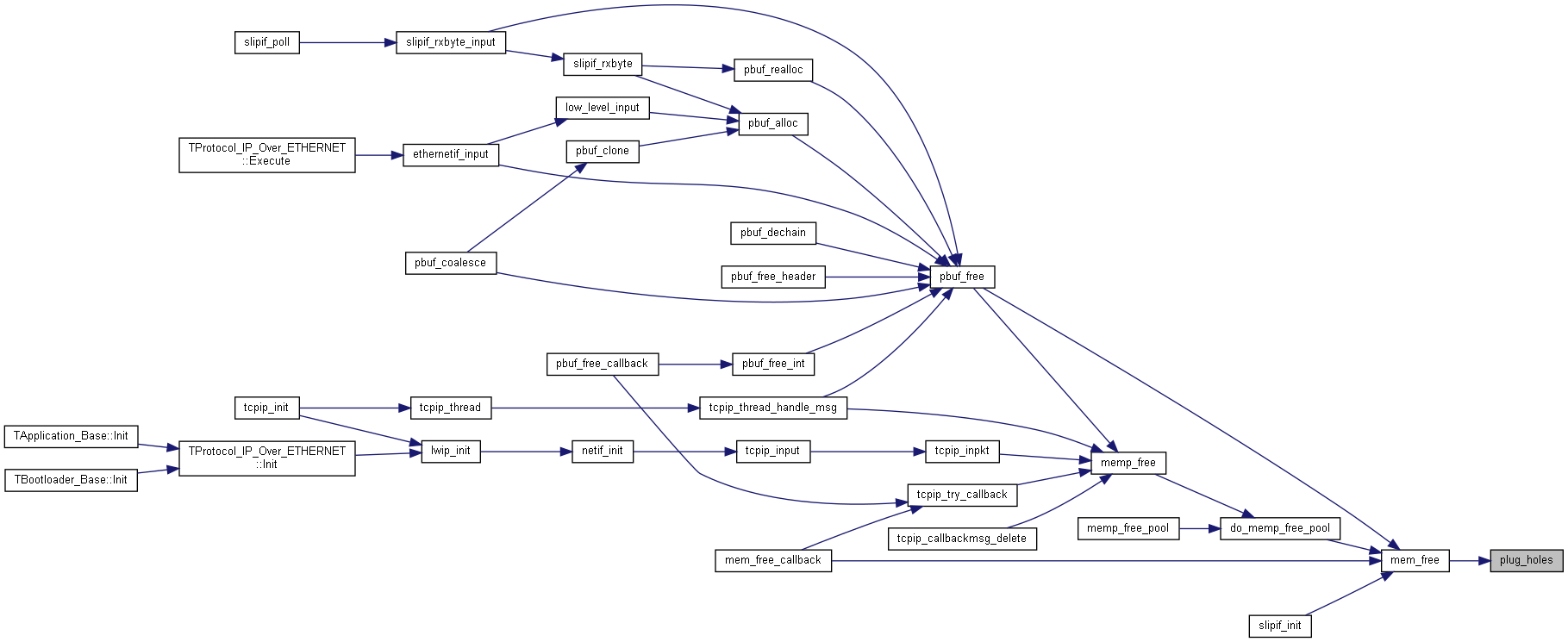
◆ ptr_to_mem()
|
static |
References ram.
Referenced by mem_init(), mem_link_valid(), mem_malloc(), mem_trim(), and plug_holes().
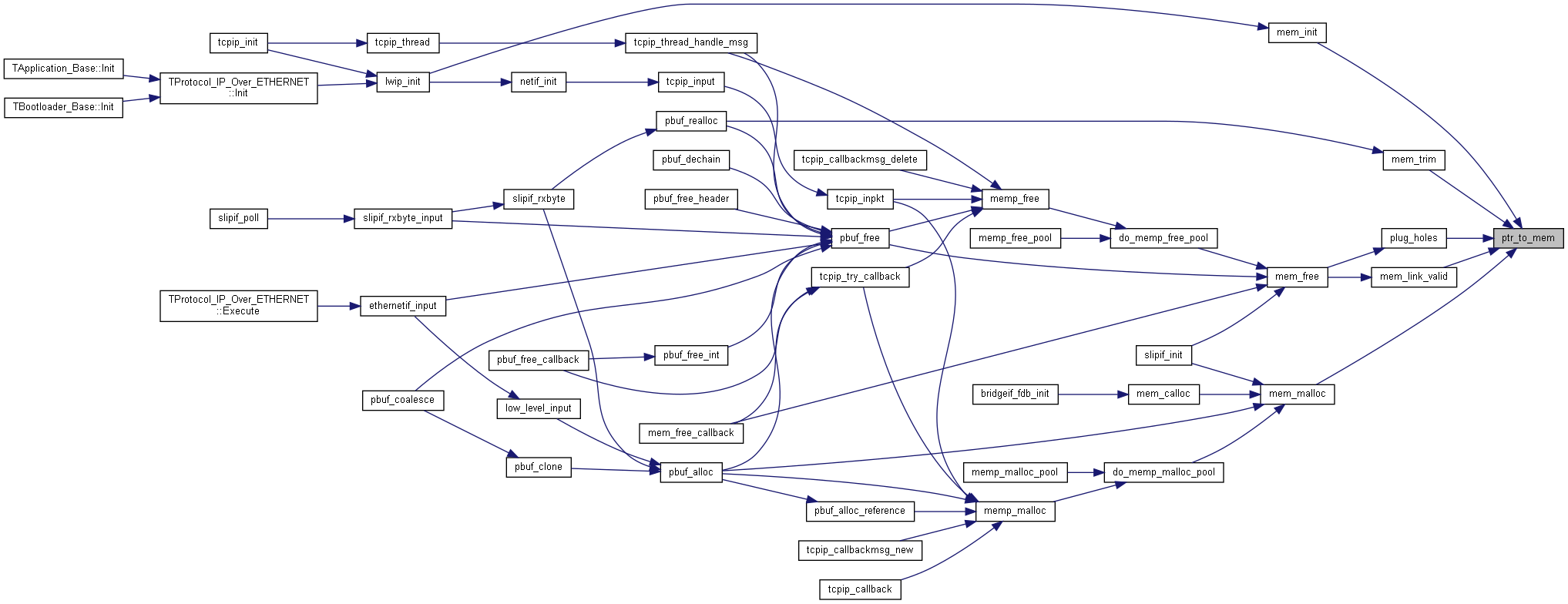
Variable Documentation
◆ lfree
|
static |
pointer to the lowest free block, this is used for faster search
Referenced by mem_free(), mem_init(), mem_malloc(), mem_trim(), and plug_holes().
◆ mem_mutex
|
static |
concurrent access protection
Referenced by mem_init(), and mem_malloc().
◆ ram
|
static |
pointer to the heap (ram_heap): for alignment, ram is now a pointer instead of an array
Referenced by mem_free(), mem_init(), mem_to_ptr(), mem_trim(), plug_holes(), and ptr_to_mem().
◆ ram_end
|
static |
the last entry, always unused!
Referenced by mem_free(), mem_init(), mem_link_valid(), mem_malloc(), mem_trim(), and plug_holes().